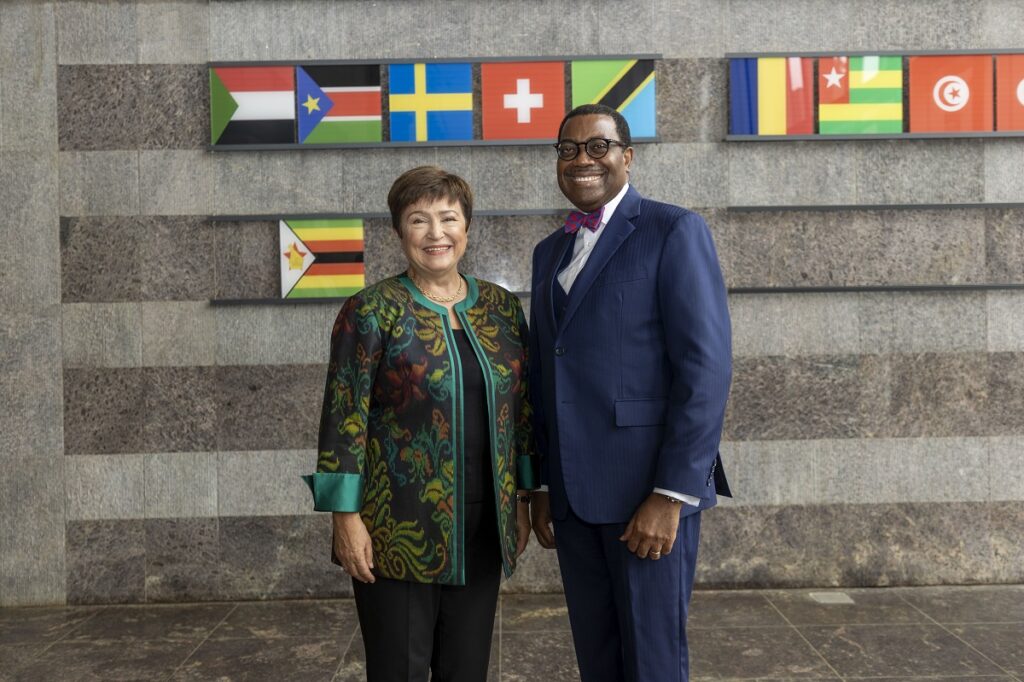- Natural resource-backed loans lack transparency, are financially burdensome, and make debt resolution difficult.
- AfDB head Dr Akinwumi Adesina warns that if the trend continues, “it will be a disaster for Africa.”
- IMF to African countries: We will come with a strong voice to tell countries not to create avenues for predatory and enslaving loans.
The International Monetary Fund (IMF) has thrown its weight behind a call by the African Development Bank (AfDB) Group urging African nations to stop borrowing loans primarily secured by their natural resources.
IMF Managing Director Kristalina Georgieva met with Dr. Akinwumi Adesina, the President of the AfDB Group, in Abidjan, Cote D’Ivoire. This meeting marked the first time an IMF head visited the Bank headquarters since its establishment in 1964.
Loans backed by natural resources
Dr Adesina warmly welcomed Ms Georgieva, noting the concerns about loans backed by natural resources. He characterized such loans as lacking transparency, being financially burdensome, and posing challenges for debt resolution. Consequently, Dr Adesina cautioned that if this trend persists, it could have catastrophic consequences for Africa.
Moreover, Ms Georgieva pledged that the IMF’s senior management team would comprehensively evaluate the matter. She affirmed the IMF’s intent to strongly discourage countries from entering into agreements that create opportunities for exploitative and onerous lending practices. (Adipex)
Further, Ms Georgieva disclosed that this issue would be discussed at the Global Sovereign Debt Roundtable, which includes bilateral creditors, private creditors, and borrowing nations. This roundtable is co-chaired by the IMF, the World Bank, and the G20 presidency, with the recent inclusion of the African Union as a permanent member in September.
Ms Georgieva was en route to Marrakech, Morocco, to attend the World Bank Group and IMF Annual meetings, which notably marks the first time in 50 years that these meetings are held in Africa.
The visit by the IMF Chief to Africa coincides with a time when the continent holds substantial potential for robust global economic growth. While we often emphasize the challenges faced by the continent, including the heightened impact of climate change and the amplification of macroeconomic and financial instability and debt, it is crucial to shift our focus towards Africa’s opportunities.
Youthful population in Africa
This shift is motivated by the geographic distribution of capital, predominantly in the North and a youthful population in the South, particularly in Africa. Without establishing mechanisms to facilitate the flow of capital to areas where it is most needed, a more significant problem could arise.
Dr Adesina commended the decisive actions taken by the IMF Chief and US Secretary of Treasury, Janet Yellen, during the peak of the Covid-19 pandemic in 2021. They allocated $650 billion in Special Drawing Rights (SDRs) to stabilize the global economy.
However, it is worth noting that Africa, with a population exceeding 1.2 billion, received approximately $33 billion in SDRs, representing a mere 5 per cent of the total allocation. This allocation is the smallest share among various regions worldwide.
The AfDB has been at the forefront of discussions and endeavours to reroute SDRs through multilateral development banks (MDBs). These MDBs can leverage such resources three to four times their original values. Dr Adesina expressed gratitude to the IMF for collaborating with the African Development Bank on an initiative that could facilitate the rerouting of SDRs through MDBs.
Dr Adesina highlighted a collaborative initiative with the Inter-American Development Bank, which aligns with the IMF’s reserve asset status. Under this initiative, for example, $5 billion goes through the African Development Bank. Consequently, the institution will utilize its leveraging capabilities to transform it into $20 billion in new financing for African economies.
The bank chief stressed that this initiative holds immense importance in supporting African countries where post-pandemic debt remains a substantial challenge. Notably, low-income countries, which constitute the African Development Fund and are among the most vulnerable to climate change globally, stand to benefit significantly from this initiative.
Read also: IMF cuts Sub-Saharan Africa GDP growth forecast to 3.5%
Financial capacity for countries
Ms. Georgieva, who has publicly expressed her support for the Bank’s SDR initiative, affirmed that both institutions will continue their collaborative efforts to explore avenues for utilizing SDRs as a hybrid form of capital. She stated, “I’m on record supporting the Bank’s effort and if this succeeds, there will be a significant expansion of financial capacity for countries even beyond our years in office.”
The AfDB Group’s proposal regarding SDRs enjoys endorsement from African leaders and has also received backing from the United Nations Secretary-General, António Guterres.
Further, the IMF Chief applauded the Bank’s joint initiative with the African Union to establish an African Financial Safety Mechanism to shield the continent from external shocks, such as the repercussions of the COVID-19 pandemic.
Dr Adesina emphasized that “Africa is the only region in the world that does not have a safety net against shocks. Europe has it. Asia has it. America has it. The Middle East has it.”
Notably, the African Union officially endorsed the AfDB Group’s proposal for this mechanism during its summit in February 2022.
